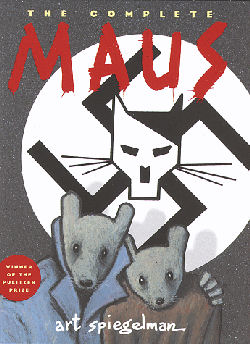Maus is one of the most critically acclaimed graphic novels ever written, and it was also the winner of the Pulitzer Prize Special Award in 1992. Maus is a historical biography about Vladek Spiegelman, a Polish Jew, and his experiences during World War II as a prisoner of war. His son, Art Spiegelman, chronicles his father’s life both as an old man trying to adjust to the modern world, and as a young man who sees his home, liberties and freedom taken away by the Nazis. Maus is an incredibly emotional, powerful and harrowing story about survival.
Writing about any piece of art or literature and saying it’s important is subjective and often a matter of taste. I believe Maus is different because it’s recording a piece of history. The story is one that should never be forgotten because it chronicles aspects of the Holocaust and the plight of the Jews during World War II. It has been studied in schools and universities, and I believe it is the only comic to have won a Pulitzer Prize.
The graphic novel is an anthropomorphic tale where each nationality is drawn as a particular animal, dogs, cats, fish, mice, etc., making it easier to distinguish between characters. It’s also designed to show how some people label those different to them—be it due to nationality, race, or religion—as another lesser species, a strong belief of the Nazis, and one that sadly persists today.
Maus is Vladek’s story of his time in Poland during World War II, but also how his experiences have had a lasting effect on his psychology, shaping his personality in ways he doesn’t even realise. As an old man, there are many quirks and aspects of his behaviour that Art is embarrassed by and cannot understand, until his father begins to tell him about his life during the war.
When the war breaks out, Vladek is a successful business man in Poland with a young wife, Anja. He is drafted into the Polish army, but later released, and he returns home to find that every aspect of his life has changed. The black market is flourishing, Jewish businesses have been taken over by Germans, and local people are being forced out of their homes to live in a small, vastly overcrowded area. The brutalisation of the Jews continues, and Vladek and his wife abandon everything, forced to move frequently to hide from the Germans who are rounding up Jews. Some of the ways Vladek and others conceal themselves to avoid capture are incredibly inventive, but this also demonstrates their growing sense of desperation, as they know their fate if they are captured. Eventually their luck runs out, they are caught, and he is sent to one of the most infamous POW camps, Auschwitz.
Maus doesn’t shy away from any of the horrors inflicted on the Jews, and we hear firsthand about some of the chilling techniques used by the Nazis to eradicate them in large numbers, including the infamous gas chambers. Vladek is a survivor, yet sometimes the only reason he lives when others all around him are executed is down to luck. There are no heroes or happy endings here, and no simple answers are given. It is a brutally honest story about the extermination of millions of people. In addition to crimes committed by the Nazis, Vladek sees people inform on their friends—the price for their betrayal might only be a bit more food. The cost of human life is worth little, and people are so desperate that they will do anything to survive.
While the story is shocking and you cannot help but feel sympathy for Vladek’s plight, he is not always a very likeable character, especially as an old man. If this were a work of fiction, he would always do and say the right thing, but the story is told in a frank fashion; we see good and bad in him and in the other prisoners.
Vladek himself becomes fairly adept at making deals with the guards to try and help his wife, who is struggling in Birkenau. Their lives are marginally easier, but they must still dodge regular inspections where the weakest are taken away to the gas chambers. Despite the cartoony artwork, it does not lessen the shock or detract from events, which are told in a straightforward, unflinching manner. The level of brutality Vladek witnesses in the camps is deeply disturbing, and his story is one that will stay with you for a long time after reading it.
Maus is a moving and very uncomfortable story about one of the worst moments in recent history. It is also an uplifting story about the human spirit and survival, something that will haunt you and should never be forgotten.
Stephen Aryan is a lifelong fan of comics, science fiction and fantasy. He co-hosts the Comic Book Outsiders podcast and writes fantasy and comic book reviews at Walker of Worlds.











Maus is an incredible work of art and storytelling. Thanks for letting other readers know about it.
I’m taken aback by the description of Vladek as a “POW” and Auschwitz as a POW camp. Auschwitz was a genocide/murder/slave labor camp. Those enslaved, and murdered, at Auschwitz and similar camps were civilians considered subhuman, including Jews, Roma (Gypsies), homosexuals — not captured, enemy soldiers.